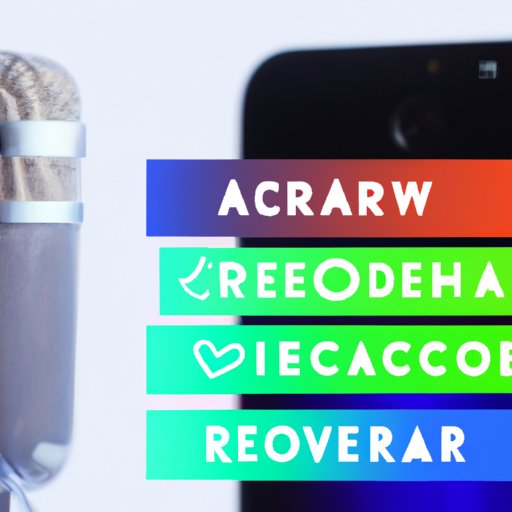Introduction
Recording conversations on an iPhone can be quite useful, especially in situations where you need to refer to the conversation later or share it with someone else. For instance, it can come in handy during business meetings, interviews, or even personal conversations. In this article, we will provide you with an in-depth guide on how to record conversations on your iPhone, the best apps to use, and legal and ethical considerations you should keep in mind.
How to Record Conversations on iPhone: A Step-by-Step Guide for Beginners
The built-in Recorder app on the iPhone can be used to record conversations, meetings, and other audio. You can also use third-party apps, such as TapeACall or Rev Call Recorder, to achieve the same result.
Using the Recorder app to record conversation is quite easy. First, open the app, and start recording by tapping on the red record button. After the conversation, stop the recording by tapping the record button again. The conversation is then saved as an audio file on your device, and you can listen to it anytime you want.
If you choose to use third-party apps, you will need to download and install the app. The process for recording conversations is usually straightforward, and you can often start recording by simply dialing a specific number provided by the app. TapeACall and Rev Call Recorder are popular third-party apps for recording calls.
The Top 5 Best Apps for Recording Conversations on Your iPhone
Aside from the built-in Recorder app on the iPhone and third-party apps mentioned above, several other great apps exist for recording conversations on the iPhone.
The top five best apps for recording conversations on the iPhone include:
- Rev Call Recorder – offers unlimited recording time and easy integration with cloud storage services.
- Call Recorder – offers high-quality audio recordings and easy sharing options.
- Rev Voice Recorder – offers voice activation and transcription services.
- iTalk Recorder – offers an intuitive interface and editing options.
- Voice Recorder Pro – offers several recording modes and editing options.
Regardless of the app you choose, each offers unique features and benefits that make recording conversations on your iPhone a breeze.
Choosing the Right Microphone for Recording Conversations on Your iPhone
The quality of the recorded conversation depends on the microphone used. The built-in microphone on the iPhone can be adequate for recording conversations in quiet environments. However, the microphone’s quality may not be sufficient in noisy environments or large conference rooms.
Therefore, it is advisable to use an external microphone to improve the quality of recorded conversations. These can include clip-on microphones, shotgun microphones, or omnidirectional microphones. It is essential to select a microphone that best suits your needs and enhances the quality of the recorded conversation.
How to Use Voice Memos to Record Conversations on Your iPhone
The Voice Memos app is a simple and useful recording app that comes pre-installed on all iPhones. The app allows you to record conversations, memos, interviews, or lectures, among other audio.
To use Voice Memos to record a conversation, open the app, and tap the large red record button at the bottom of the screen. Once you finish recording, tap the stop button. The recording is then saved in the app, where you can listen to it, rename it, trim it, or share it via email, messages, or social media.

Recording Conversations on Your iPhone: Legal and Ethical Considerations to Keep in Mind
It is essential to keep in mind that recording conversations, whether in-person or over the phone, without the explicit consent of all parties involved, may violate state and federal laws. Therefore, it is crucial to familiarize yourself with the privacy laws in your state before you start recording. You may also need to obtain written consent from all parties before recording the conversation.
It is also essential to consider the ethical implications of recording conversations. While recording conversations may be legal in some situations, it may still be unethical in others, especially in personal conversations that involve sensitive information. Therefore, it is essential to consider the impact the recordings may have on other people, their privacy, and their reputation.
The Ultimate Guide to Recording Phone Calls on Your iPhone
Recording phone calls on your iPhone can also be done using either the built-in recorder app or third-party apps mentioned above. The process is usually straightforward once you install the app of your choice.
To use the built-in recorder app to record phone calls, you can start a conversation and then choose to add another call. This will start a conference call with yourself and the other person. Then, you can start recording the conversation using the built-in recorder app by tapping the record button.
Third-party apps such as TapeACall or Rev Call Recorder can make this process even easier by allowing you to start recording as soon as you dial the number. You can also save the conversation and share it with others using these apps.
How to Edit and Share Your Recorded Conversations from Your iPhone
The iPhone provides several editing and sharing options for recorded conversations. For instance, you can use the Voice Memos app to trim, rename, or delete recordings. You can also share the recordings via email, text messages, or other apps such as Dropbox or Google Drive for easy access by others. Third-party apps such as Call Recorder also offer editing and sharing options for recorded conversations.
Conclusion
Recording conversations on an iPhone can be quite useful, be it for personal or business reasons. With this comprehensive guide, you now know the different methods to use, the best apps to get, and the legal and ethical considerations you should always keep in mind. It’s time to start recording those conversations that matter to you.
